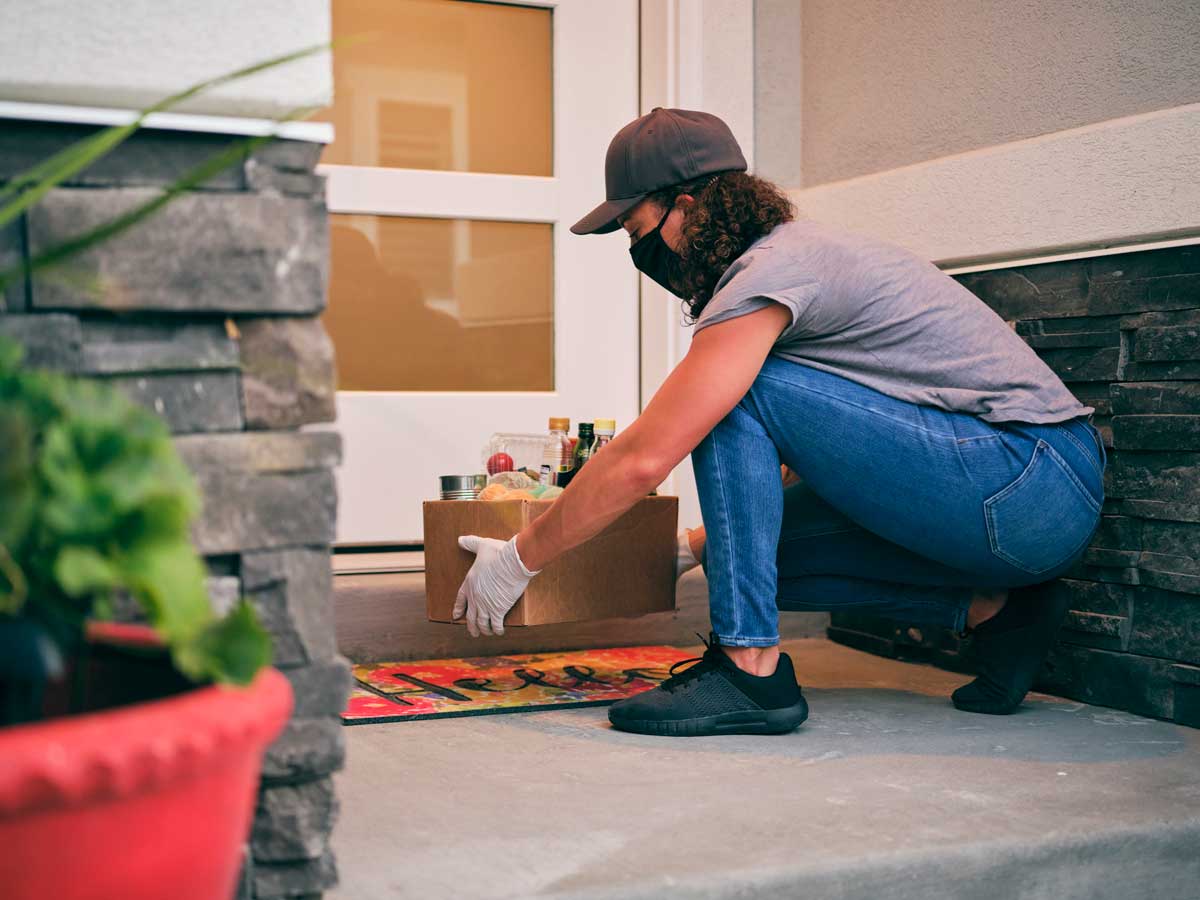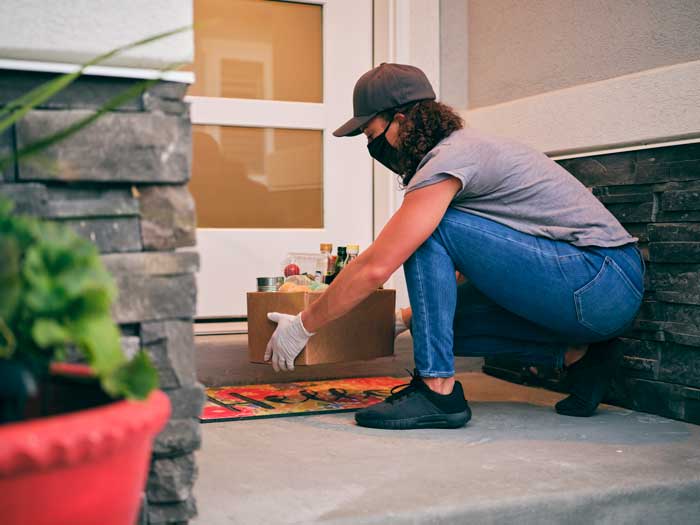
10 tips for pivoting your business in the face of COVID-19
 A number of restaurants in Canada have started delivering groceries in addition to take-out meals (Getty Images/svetikd)
A number of restaurants in Canada have started delivering groceries in addition to take-out meals (Getty Images/svetikd)
From vodka to hand sanitizer, car parts to ventilators, the past few months have seen companies doing somersaults to adjust to new market needs in the face of COVID 19.
“In the past, companies used to take time to develop a strategy. But COVID-19 has turned that way of thinking on its head,” says Ismail Akhter, CPA, associate director, member in practice, audit, assurance and reporting at CPA Canada.
But what if your company is having trouble adjusting to the crisis and is in need of inspiration?
Lior Zehtser, co-founder of online accounting firm ConnectCPA, puts it this way: “To pivot, you really need to think outside the box and be comfortable with taking a risk and experimenting with a different or unique business model. Your idea obviously has to take the friction away from close contact, so anything delivery-based—or anything ‘contactless’—would be a great start.”
Here are some ideas on how to reinvent yourself, based on businesses that are doing it already.
1) SOLVE DELIVERY DILEMMAS
In keeping with Zehtser’s suggestion, many new businesses have popped up in the delivery and food services sector. “The need seems almost insatiable at the moment,” he says.
Among the many innovative solutions in the market is one proposed by Montreal’s Virtual Front Desk. It found a way to help seniors do their shopping from home, while communicating via video with an employee in the grocery store.
Another example is Toronto’s Culinary Adventure Co., which normally operates food tours to different neighbourhoods. It created what it calls Food Tours in a Box™—a curated selection of favourite treats and meals from different neighbourhoods and partners—which it then delivers to your door.
2) GO BACK TO BASICS
At a time when demand is skyrocketing in certain areas, limiting the products you offer can be a smart way to make best use of your resources. ItalPasta, for example, normally makes 63 types of pastas. Now, it’s focusing on the top six cuts in its Tradizionale range. “People aren’t so fancy right now. They just want pasta,” said owner and president Joseph Vitale.
Similarly, tissue products manufacturer Kruger Products is now only making its high-demand brands and formats, such as Cashmere bathroom tissue and SpongeTowels paper towels.
“The key is to understand where the greatest need is, listen to your customer and limit your production to those items. That way, you can manage the efficiency of your operations,” says Akhter.
3) PROVIDE ENTERTAINMENT
Now that families are at home, offering a diversion—especially one that brings the family together—can turn boredom into memorable moments. For example, Gordon Johansen, owner of Sentry Box, a Calgary gaming store, said demand has been strong. “People are looking for things to do,” he said.
Like Sentry Box, Matthew Stepanic started offering delivery services for the Glass Bookshop store he co-owns in Edmonton. And once he closed the store, the number of orders quadrupled. “When you’re alone and just scrolling through Netflix, a new book is a different type of comfort,” he said.
4) ADD TO YOUR PRODUCT MIX
Companies in the food sector, among others, are listening to customers and providing new services. For example, Fruit Suite normally ships fruit and snacks to offices. Now it has pivoted to making home deliveries but is has also added eggs, bread and vegetables to its offerings. “It’s looking to expand further to other categories as well,” says Zehtser of the company.
In the same vein, a number of restaurants are launching online grocery stores. For example, at Ottawa restaurant Occo Kitchen’s online marketplace, customers can purchase everything from breakfast sausages to almond milk.
5) TACKLE HEALTH NEEDS
Finding a way to give back while staying in operation is ideal. For example, Spirit of York Distillery Co. and Geoff Dillon’s Small Batch Distillers are both making hand sanitizers. “These companies are also offering the products for free or at a discount to essential service providers or those that can’t afford it,” says Akhter. “This is a good way to give back to the community. And it builds loyalty with customers.”
Normally, Montreal fragrance maker Stimulation Déjà Vu produces scents that evoke events or places in the city. Now, it has come out with an intriguing new product: scented antibacterial sprays with 85 per cent alcohol that carry dreamy names such as Balade en hiver (Winter stroll) or Voyage de ma fenêtre (A trip from my window). “The way we see it, they’re going to become part of our regular line,” says founder and president Audrey Bernard.
Leslie Brooks, president of Hippo Hug, a Calgary manufacturer of weighted blankets, is doing her part for the COVID-19 cause by creating removable cloth covers for face masks. And, right now, there is a two- to four-week wait to fulfill orders. (Could they become a standing item? One viral researcher says masks—even fashionable ones—should become a permanent fixture in a post-breakout world.)
6) TAKE IT ONLINE
As events get put on the back burner, livestreaming and video conferencing can be a lifesaver—or at least a way to stay connected. And, as Akhter points out, they can sometimes introduce you to an entirely new audience, even one that extends beyond our borders.
Examples are many. Musicians are broadcasting sets from home on platforms, such as Instagram Live, along with donation links. Many fitness clubs have moved their classes online, as have music schools such as Fantasie in Halifax or yoga studios like Namaste in Corner Brook.
As Namaste’s owner-operator Nancy Buckle said, “It’s just a sensible step for any brick-and-mortar yoga studio business if you have the opportunity to do it.”
7) INCUBATE IDEAS
An incubator can be the perfect place to nurture an idea and build contacts. For example, every year, Montreal’s MT Lab hosts a number of startups creating innovative solutions for major players in the tourism, culture and entertainment industries. This year, it joined with other partners to send out a call for immediate solutions to the crisis. “We realized that, by compiling the ideas into a catalogue and making it public, this would create opportunities,” said managing director Martin Lessard.
The call drew a huge response. One idea came from Stay22, which normally helps travellers find Airbnb rooms and hotels near events. It designed a solution to help health workers find accommodations near hospitals and clinics.
The lab is now preparing another catalogue of proposed COVID-19 solutions to be issued once the peak of the crisis has passed, said Lessard.
8) GET INSPIRED GLOBALLY
It’s easy to find inspiration not only within Canada’s borders but far beyond as well. A search on Gofundme for “ventilator COVID” produces 1,559 results (26 for Canada). And the results for “gloves COVID-19,” are even more impressive: 2,615 in all, with 76 for Canada.
It seems no matter where you look, ideas are bubbling. In Wales, researchers have developed a virus-killing snood (a “neck hugger” scarf that can be pulled up to cover the nose or head) and a hands-free door pull. In Jamaica, a student has come up with an ultraviolet device that kills bacteria on doorknobs. In Morocco, students developed a system that delivers information about the patient’s respiratory system to doctors, who can then adjust pressure and respiratory flow remotely.
“Globally, we are more interconnected than ever,” says Akhter. “Learning how other businesses around the world are adapting provides a great opportunity to be inspired.”
9) SUPPORT YOUR COMMUNITY
Many restaurants are changing their usual fare to suit the times—and their area. For example, Montreal restaurant La Prunelle has created an open-air market where it serves a locally produced selection of upmarket street food through a window.
Meanwhile, Toronto restaurant Rasa let neighbours know about its takeout options by sending around a simple old-fashioned letter (created and delivered with every precaution, according to the restaurant). The letter noted that neighbours would receive 10 per cent off all call-in pickup orders. The restaurant quickly sold out and had to re-order supplies.
In New Westminster, Alejandro Diaz owns two restaurants (El Santo and Amaranthus), both of which are temporarily closed. Instead, he is offering a weekly three-course dinner for pickup. (He has also partnered with Royal Columbian Hospital Foundation to provide 150 meals every Monday to hospital staff.)
Although Diaz, who has a background in finance, says he is bringing in only a tiny fraction of what he normally would, staying true to the company’s values and maintaining its engagement with the community are even more important. “A business goes far beyond finance,” he says. “When things open up again, we want to be there.”
10) LOOK FOR GUIDANCE
Through the new Business Resilience Service (BRS)*, you can connect with experienced business advisers—including 125 CPAs across the country—for guidance on everything from deciding which government relief programs will be most appropriate for your needs to reshaping your business in the face of COVID-19. The four-week bilingual hotline service was launched on May 25 and is supported by the Government of Canada.
11) STAY ATTUNED TO CHANGING TRENDS
As Akhter points out, COVID-19 situation is still evolving and so is the new normal. “No matter when the crisis ends, the way small businesses operate has fundamentally changed,” he says. “We’ll never go back completely to the way things were. That’s why it’s really important to keep on top of research about changing consumer trends and to have a plan that is flexible enough to let you keep adapting.”
MORE COVID-19 UPDATES
Learn about coping with COVID-19, including survival tips and how to ensure business continuity. Plus, view the free webinar on maximizing your business during and after the pandemic.